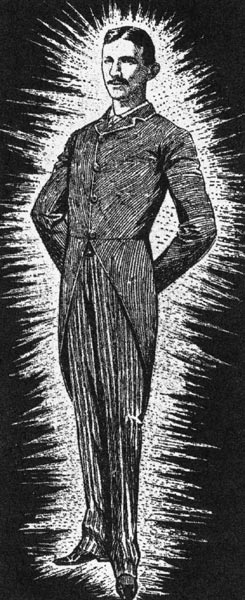
This Article From Issue
September-October 1998
Volume 86, Number 5
DOI: 10.1511/1998.37.0
Strange Brains and Genius: The Secret Lives of Eccentric Scientists and Madmen. Clifford A. Pickover. 332 pp. Plenum, 1998. $28.95.
Clifford A. Pickover on Oliver Heaviside, the mathematical genius whose vector analysis of electromagnetic phenomena laid the basis for our modern communications technology: "The granite furniture stod about int he bare room like the furnishing of some Neolithic giant through whose fantastic rooms he wandered, growing dirtier and dirtier, and more and more unkempt—with one exception. His nails were always a glistening cherry pink."

From Strange Brains.
Strange Brains and Genius is indeed a strange book about strange persons. Pickover profiles nine scientists, philosophers, writers and inventors, including Samuel Johnson, Richard Kirwan, Francis Galton and Theodore Kaczynski. The biographies are fascinating, and Pickover lists accomplishments for each subject and elaborates on their abhorrent, often antisocial behavior. The author focuses on the eccentricities of the subjects who often grew stranger with age. There's Nikola Tesla, who invented the induction motor and made alternating current a commercial success. He believed in 1900 that he received radio messages from Mars. Jeremy Bentham, the philosopher who most influenced John Stuart Mill, named his household appliances and left a will requiring that his body be dissected and flayed in front of his friends. In these presentations, the author is laying the groundwork for relating mental illness and genius.
Pickover also writes about obsessive-compulsive disorder and temporal lobe epilepsy, and offers a series of notes on recent breakthroughs in mental-illness research. He also includes results of his "Human Mind Questionnaire," which he sent to a variety of people. Questions include, "What is genius?" and "Would you pay $5,000 to increase your I.Q. 100 points?" This section could have been omitted; the replies read too much like casual lunch-table discussions.
Pickover's biographies are worthy of inclusion in an encyclopedia. He judges, with a historian's eye, the meaning of an individual's accomplishments and motivations. Strange Brains and Genius is not an easy read, but it should appeal to a wide audience, much like a complex Picasso painting might: It's intriguing, bright and sometimes bizarre, and one has to look at it from a variety of directions, probably more than once, but one is still likely to walk away feeling not completely sure what the point was. Still, a reader can't help but be intrigued by the unusual lives Pickover chronicles, although he or she will probably want to take it just a little at a time.—Thomas L. Isenhour, Chemistry and Biochemistry, Duquesne University
American Scientist Comments and Discussion
To discuss our articles or comment on them, please share them and tag American Scientist on social media platforms. Here are links to our profiles on Twitter, Facebook, and LinkedIn.
If we re-share your post, we will moderate comments/discussion following our comments policy.